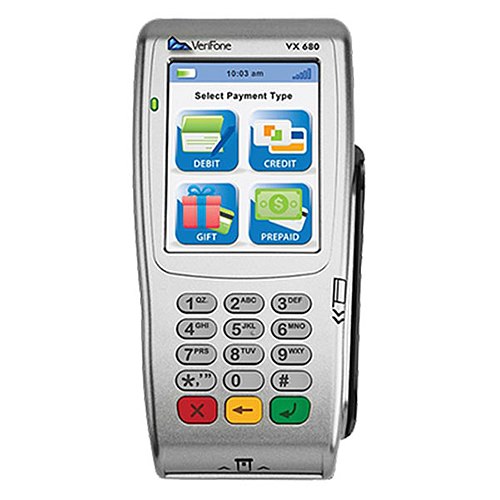About Verifone
This stock analysis article is a bit different from what we’ve traditionally done in the past, although we’ve put together our fair share of theoretical acquisition analysis articles as well as hedge fund manager analysis articles.
So it’s not completely out of left field.
Contrary to one’s initial belief, Verifone is not some random telecommunications conglomerate, even though its name heavily implicates itself as such. Even though you don’t know Verifone, trust us when we say you know Verifone.
Specifically, if you’ve found yourself doing some extensive Christmas season shopping and have been swiping your plastic more than you’d like, the chances are slim to none that those transactions (we’ve written a stock analysis article on Mastercard in the past) weren’t done on one of the company’s devices.
For a more formal definition, Verifone’s product offerings specialize in devices that act as electronic payment solutions. In other words, the company makes the machines and equipment that you use to swipe or tap your card on and poof, the transaction is completed within seconds and your wallet proceeds to weep.

Hopefully that’s been your experience, at least.
We’ve analyzed companies similar to Verifone in the past.
One key difference to note off the bat is that at the time of this article’s publication, Verifone is a private company, meaning that you are unable to invest in this company in the publicly traded stock exchanges.
Although Verifone is a large player in this space, some threats of competition have been mounting from the likes of NCR, Clover and likely one of the company’s largest threats, a point-of-sale (POS) platform founded by one of the more notable founders of Twitter, Jack Dorsey.
The company is called Square and it is publicly traded at the time of this publication.
About Square
While we’re not sure about how prominent Square’s platform and technology has become in your neck of the woods, it sure has made its mark in and around Austin, Texas.
We’ve seen the company’s technology and POS system(s) implemented heavily with smaller, local businesses such as food trucks, restaurants, mini boutiques and other small scale stores in and around Austin metropolitan.
Even though this company is seemingly growing and retaining customers such as small businesses, it’s crucial that we still walk through some Square’s core financials and get a good idea as to what kind of financial shape the company is currently in, as this can be important when there is potential for an acquisition, even if it is hypothetical at the moment.

First and foremost, the company is not yet profitable, which isn’t necessarily an instant red flag but is something to keep in mind throughout this analysis.
According to the company’s balance sheet, Square’s executive team tends to around $15 billion in total assets as well as around $11.7 billion in total liabilities. Initially, we projected that Square’s balance sheet would’ve been upside down or total liability-heavy given the recent and current unfavorable state of the economy, however, we’ll take unexpected (happy) surprises any time of the day.
Additionally, this company’s total revenue over the last five years have been nothing short of skyrocketing, at the launching pad in 2017 at around $2.2 billion and approaching the moon at its latest figure of approximately $17.6 billion, as reported in 2021.
This is excellent, proven growth, although one must keep in mind that this rate of growth is likely to taper off as the current recession deepens and Square begins to receive less and less commissions per transaction as consumers begin spending less.
This is a very, very economically sensitive business in that regard.
We were also surprised to find that Square has turned the positive net income corner rather quickly, standing negative in 2017 and 2018 but since bending the corner ever so smoothly in 2019, with net income standing at $375 million.
Total cash from operations during the same five year time frame has been excellent as well, as it has been reported as positive each year, even in 2017 and 2018.

Nevertheless, as we’ve seen in previous stock analysis articles, growth usually, at least at first, comes at the expense of profit.
This is just one of the many reasons we think Square should consider putting itself up for sale and Verifone should be the acquirer to get the job done.
Why should Verifone acquire Square?
From our perspective, Verifone is sort of like the International Business Machines (IBM) of the point-of-sale space; it’s a bit of a dinosaur in the industry and it doesn’t scream “growth” for years to come.
Given what we have mentioned in the paragraphs above, why in the world should you care about Verifone and its growth prospects to begin with? Isn’t it just a privately held company? I can’t make money off of that.
One would technically be correct, however, if one had stock in Square (NYSE: SQ) and rumors simply began to emerge that the company was looking to be sold or that there was an interested buyer entering the ring, Square’s stock price would pop up immediately as the company’s shares would rise and rise until (or if) the company was fully acquired, as Verifone in this hypothetical scenario would have to pay a high enough premium to make Square’s shareholders willing to give up their present stake(s) in the company.
Money would be made by Square’s shareholders in this case, if they held their stock until the acquisition fully closed.
Zooming out a bit and honing in on the perspective of Verifone and its current owner, leading technology private equity firm Francisco Partners, an acquisition of a smaller but technologically savvy point-of-sale company, especially before it grows too much and becomes too expensive makes sense.
.jpg/350px-Square_(4439682573).jpg)
Although we don’t have the exact means of verifying Verifone’s current financials as it is a private company, it is clear that Verifone is a well established player in the space and Square is nibbling at its lunch day after day.
This is one of the many reasons Verifone should look into buying Square.
It must also be noted that buying a company such as Square outright isn’t an inexpensive or easy endeavor to undertake. For instance, at the time of this publication Square’s market capitalization implies that the company is presently worth around just north of $35 billion.
Although we can’t say for sure, the likelihood that Verifone has that sort of cash laying around is slim to none.
This is why if we were Verifone we would be considering and making plans now, reaching out to lenders and other parties potentially interested in underwriting and financing this kind of deal, and subsequently making a formal, public bid as the current recession deepens, so as to attempt to purchase the company at a much lower price and when it is in a more vulnerable state.
The fact that Square is resoundingly sensitive to a weakening economy bodes quite well for Verifone in this scenario.
Additionally, from the vantage point of Verifone’s executive team(s), Square provides an excellent launching pad for future growth and acts as a major moat and catalyst for staying ahead of the digital payments curve while also generating a considerably higher amount of total revenue from the small business crowd, as we have seen most of Verifone’s current equipment and devices in larger corporate chains, not small businesses.
On the other side of the coin, if we were one of the leaders of Square or just a minority shareholder in the company for that matter, in the current frothy, uncertain and overall poor economic environment, a sale at a premium price wouldn’t sound like a terrible option at this juncture.
Although all of this is just a hypothetical scenario, it makes sense to us.

Verifone’s stakeholders would stand to benefit in the long run, Square’s stakeholders would also stand to gain from selling shares at a sizable premium in this current market environment, allowing them to get cash back or enable them the ability to deploy capital elsewhere; whatever they fancy. Also, there is something to be said regarding the potential benefit to consumers across the globe if such an acquisition were to go through.
Yes, one should be vigilant around companies becoming too large and too powerful, as this is a primary function of the Federal Trade Commission (FTC) and the United States’ Department of Justice (DOJ), however if the deal were properly combed through and the appropriate concerns were correspondingly addressed, integrating Square’s technology and other intellectual property would undoubtedly help Verifone deliver speedier, more satisfactory services for its merchants and in turn their customers, all at a (hopefully) lower price, again, if the relevant government entities monitored the deal, its terms and its current and future implications responsibly and objectively.
In a world full of possibilities, it’s fun to think outside of the box sometimes, however, this transaction doesn’t seem quite as out of the box or far-fetched as one might initially assume.
DISCLAIMER: This analysis of the aforementioned stock security is in no way to be construed, understood, or seen as formal, professional, or any other form of investment advice. We are simply expressing our opinions regarding a publicly traded entity.